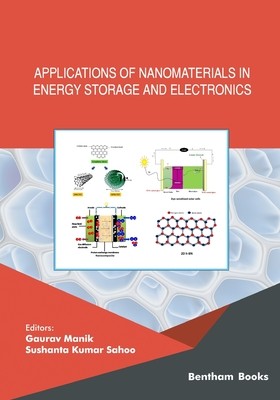
- We will send in 10–14 business days.
- Publisher: Bentham Science Publishers
- ISBN-10: 9815050737
- ISBN-13: 9789815050738
- Format: 17.8 x 25.4 x 2 cm, minkšti viršeliai
- Language: English
- SAVE -10% with code: EXTRA
Applications of Nanomaterials in Energy Storage and Electronics (e-book) (used book) | bookbook.eu
Reviews
Description
This volume describes recent advancements in the synthesis and applications of nanomaterials for energy harvesting and storage, and optoelectronics technology for next-generation devices.
This book consists of 15 chapters that cover a range of nanomaterials and the corresponding technologies. The initial chapters summarize the recent progress in applications of nanomaterials like carbon nanotubes, metal oxides, and graphene oxides-based hybrids in solar energy harvesting using recent photovoltaic technologies. These chapters are followed by reviews on nanowires, graphene quantum dots, boron nitrides, carbon nano onions and metal organic frameworks leading to the fabrication of supercapacitors, bio-sensors, lithium-ion batteries and hydrogen storage applications. The final set of chapters cover the next generation fuel cells using polymer nanocomposites, ferroelectric liquid crystal nanocomposite and optoelectronic nanomaterials for optical memory and displays devices. Key Features: Describes the types of nanomaterials that are fundamental to energy storage and electronic systems. These materials include nanowires, graphene quantum dots, boron nitrides, carbon nano onions and metal organic frameworks (MOFs),Covers the processes for nanomaterial synthesis
Reviews important photovoltaics applications of nanomaterials, including their use in energy storage, batteries and optoelectronic devices
Discusses the application of nanomaterials in electronics for sensing, bioelectronics, memory, nanocomposites for fuel cells, ferroelectric liquid crystal nanocomposites and optoelectronic nanomaterials for optical memory and displays
Provides references for further reading in every chapter The volume informs engineers, academic researchers, research scholars and graduate students working in the area of nanomaterials for energy generation, storage and optoelectronics.
EXTRA 10 % discount with code: EXTRA
The promotion ends in 23d.15:19:38
The discount code is valid when purchasing from 10 €. Discounts do not stack.
- Publisher: Bentham Science Publishers
- ISBN-10: 9815050737
- ISBN-13: 9789815050738
- Format: 17.8 x 25.4 x 2 cm, minkšti viršeliai
- Language: English English
This volume describes recent advancements in the synthesis and applications of nanomaterials for energy harvesting and storage, and optoelectronics technology for next-generation devices.
This book consists of 15 chapters that cover a range of nanomaterials and the corresponding technologies. The initial chapters summarize the recent progress in applications of nanomaterials like carbon nanotubes, metal oxides, and graphene oxides-based hybrids in solar energy harvesting using recent photovoltaic technologies. These chapters are followed by reviews on nanowires, graphene quantum dots, boron nitrides, carbon nano onions and metal organic frameworks leading to the fabrication of supercapacitors, bio-sensors, lithium-ion batteries and hydrogen storage applications. The final set of chapters cover the next generation fuel cells using polymer nanocomposites, ferroelectric liquid crystal nanocomposite and optoelectronic nanomaterials for optical memory and displays devices. Key Features: Describes the types of nanomaterials that are fundamental to energy storage and electronic systems. These materials include nanowires, graphene quantum dots, boron nitrides, carbon nano onions and metal organic frameworks (MOFs),Covers the processes for nanomaterial synthesis
Reviews important photovoltaics applications of nanomaterials, including their use in energy storage, batteries and optoelectronic devices
Discusses the application of nanomaterials in electronics for sensing, bioelectronics, memory, nanocomposites for fuel cells, ferroelectric liquid crystal nanocomposites and optoelectronic nanomaterials for optical memory and displays
Provides references for further reading in every chapter The volume informs engineers, academic researchers, research scholars and graduate students working in the area of nanomaterials for energy generation, storage and optoelectronics.


Reviews